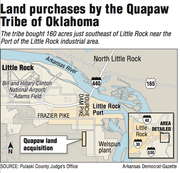The Quapaw Tribe of Oklahoma told the U.S. Bureau of Indian Affairs that tribe officials have no plans for a 160-acre piece of southeast Pulaski County that they hope to place into federal trust, according to a copy of the tribe's application supplied by a tribe spokesman.
The application also indicates that the land would remain subject to local and state laws even if acquired in federal trust, tribe spokesman Sean Harrison confirmed Wednesday.
Placing land in federal trust gives the federal government the legal title to the land but keeps "beneficial interest" with the tribe, according to the Bureau of Indian Affairs website. It also exempts the land from state and local taxes, though the land is often later subjected to state compact fees similar to taxes. It would not become "sovereign" land.
Harrison sent out a copy of the application Wednesday morning in an email to Arkansas news media expressing concern about speculative reports appearing Tuesday about an "imagined casino project" in Pulaski County.
"Just to clarify regarding the 160 acres in Little Rock: The Quapaw Tribe has no plans for a casino," Harrison wrote in the email. "Our interest in the land is cultural -- there are archeological sites, graves and artifacts on that land. It has been everyone else, not us, talking about the idea of a casino."
The application contains a history of the Quapaw tribe's presence in that area of Pulaski County and extensive details on the discovery of graves of Quapaw people and artifacts from that era.
Since the tribe's 2012 acquisition of some of the land, speculation has occasionally arisen about whether tribe officials intended to build a casino like the two it operates in Oklahoma. Little Rock Mayor Mark Stodola mentioned the tribe's pursuit of the land during his State of the City speech March 19 in an effort to raise further public concern.
Stodola and County Judge Barry Hyde said last week that they hadn't spoken with tribe officials but were worried that the broad community would have little say in a casino because the land would no longer be subject to local laws and approval for placing the land in trust was up to the federal government.
The tribe's application indicates otherwise.
"The Quapaw Tribe has no present plans to change the use of the property," tribe officials wrote in the application.
"The property to be taken into trust currently is subject to full criminal/prohibitory jurisdiction of the United States, the State of Arkansas, and Pulaski County," tribe officials wrote in the application. "Once the land is accepted into trust, the BIA and/or the Quapaw Tribe will have additional criminal/prohibitory jurisdiction over the property, as established by federal law."
Arkansas law on gambling allows only for Oaklawn Racing and Gaming in Hot Springs and Southland Park Gaming and Racing in West Memphis to exist.
"As the Quapaw Tribe has no plans to develop or otherwise change the use of the property at this time, jurisdictional conflicts or other problems should not arise," the officials said in the application. "The Tribe currently has in effect intergovernmental agreements with numerous jurisdictions, and is willing to consider such agreements for the parcels should any concerns or issues arise in the future with respect to the land."
A Bureau of Indian Affairs realty division worker in its Nashville, Tenn., office said that applications should indicate any specific use of the property. If tribe officials planned to build a casino, a museum, a historical trail or anything else, the official said, the bureau expects them to indicate it on an application.
To establish a casino, a tribe must go through the Washington, D.C.-based Office of Indian Gaming.
Harrison said tribe officials, including tribal Chairman John Berrey, have not confirmed plans for a casino but have simply "not said no."
In a sworn statement Dec. 23, Berrey wrote: "There will be no change in land use. The property is mostly crop land with some timber and there are no plans for development of this property at this time. The acquisition of the land is necessary to facilitate tribal self-determination, and to maintain the continuing cultural identity of the tribe by preservation of historic and cultural sites, practices, and identity of the Quapaw Tribe."
The application, dated Dec. 30, includes several letters in support of the tribe's request to have the land placed in federal trust, including those from former Attorney General Dustin McDaniel, Vilonia Mayor James Firestone, Wellspun Tubular President David Delie and the property owner who sold the land to the tribe.
They cited the tribe's history in Arkansas and reputation for spurring economic growth in their communities. In addition to the Quapaw Casino and Downstream Casino in east Oklahoma, the tribe operates Eagle Creek Golf Course and a tribal museum.
Former County Judge Buddy Villines wrote a letter in late December in support of the tribe's application, citing the tribe's history in Arkansas. The letter was not included in the tribe's application but was obtained by the Arkansas Democrat-Gazette last week.
The Quapaw Tribe purchased 80 acres of land in October 2012 just south of the Little Rock industrial port, east of Thibault Road, near Interstate 440, for $775,000, according to Pulaski County property records. The tribe purchased a second 80 acres of land in April 2013 in that same area for $597,000.
The tribe purchased the land after the discovery of tribal artifacts and Quapaw grave sites. The Quapaws, indigenous to Arkansas, were relocated to northeast Oklahoma in the mid-1800s.
Last year, the tribe learned that graves of black people were also found on the land, likely dating back to before the Civil War. The tribe has a partnership with the Preservation of African American Cemeteries group and is focused on maintaining the grave sites.
Metro on 03/26/2015

